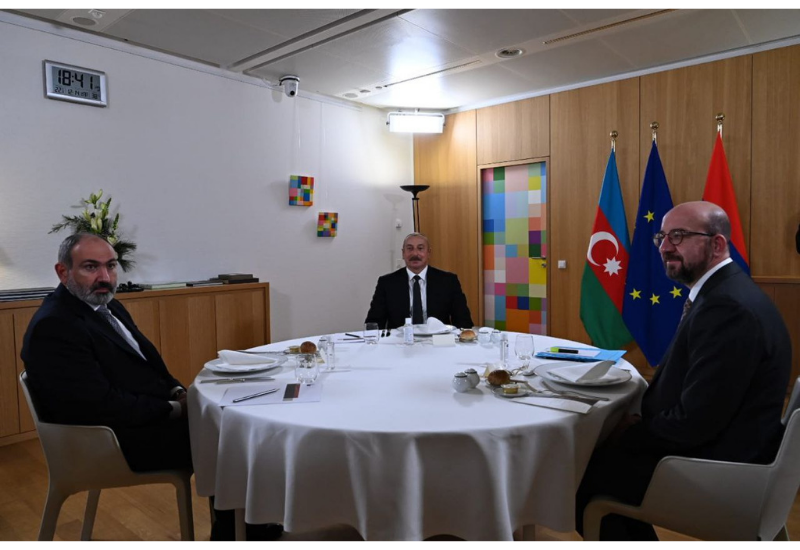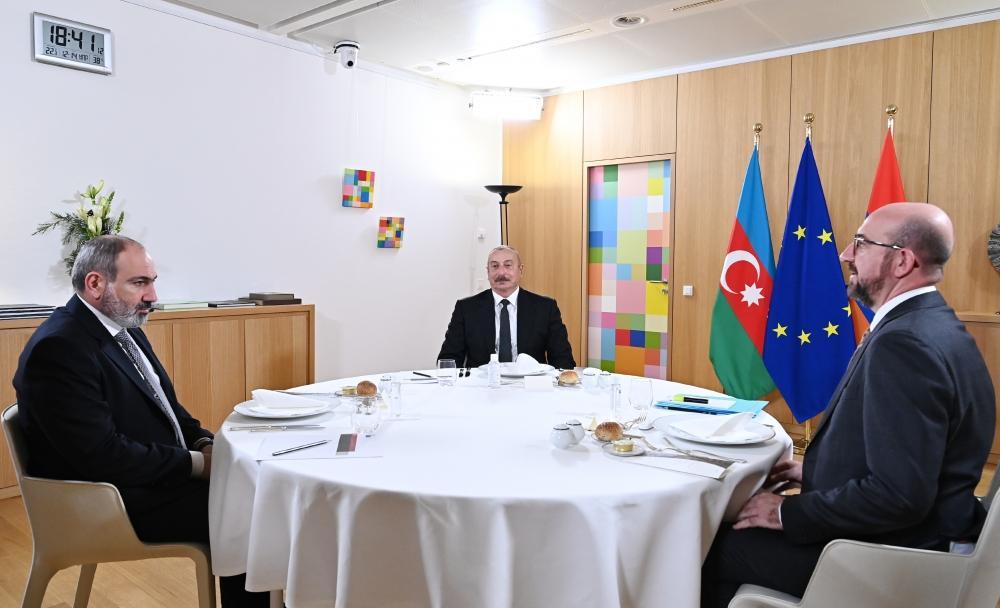Fine swagger from Baku and shilly-shallying from Yerevan

By Orkhan Amashov
Disgruntled and perturbed in Sochi, and somewhat disaffected in Stockholm, Yerevan was seeking to use the Brussels meeting as a home leg to inflict a diplomatic injury on Baku. However, despite the futile endeavours of Yerevan, nothing that took place in the bureaucratic cathedral of the EU on December 14-15 suggested that Armenian Prime Minister Nikol Pashinyan managed to make a single plausible move to fulfil any of the asinine plans inundating the homegrown political arena. The Brussels summit also provided a chance to revisit EU-Azerbaijan relations, with a particular emphasis on the energy component of the ties.
In Brussels, during his joint press conference with NATO General-Secretary Jens Stoltenberg, Azerbaijani President Ilham Aliyev reiterated his country’s unwavering commitment to the Zangazur corridor project and claimed that if Armenia refuses to provide an uninterrupted connection through its Syunik province, it will have implications for the Lachin corridor. In diplomatic and analytical circles, the parallels have long been drawn between the two, but the idea had hitherto never been voiced officially. In an apposite move, President Aliyev chose the European capital to make this position known to the world at large.
The Zangazur corridor is pivotal to Baku’s vision of the future of the South Caucasus, and it is being pushed through assertive diplomacy. President Aliyev has expressed his country’s readiness to accept both options, in other words, either there could be customs checks both on the Lachin and Zangazur corridors or none on either. This appears to be a very wise and calculated move to force Yerevan’s hand towards agreeing to the legal regime suggested by Baku. Armenia, at this stage, is still engaged in some tasteless shilly-shallying. In his Facebook post, Pashinyan confirmed that the sides agreed on the opening of the railway, where border and customs rules will be applicable on the principle of reciprocity. This shows, at least on an official level, that Yerevan is not yet ready to acquiesce with Baku’s proposal.
Pashinyan did not dare, in public earshot, to utter a single line of the most generic and vague nature imaginable, connected with the so-called status of Karabakh. Although it cannot be said with absolute confidence with what degree of compulsive urge the subject had been preying on his cluttered and bemused mind prior to the meeting, what is evident is that he was under huge pressure from some members of his own government, opposition and the Armenian diaspora to raise the issue.
Nothing that has occurred within the walls of the EU has deviated from the agreements achieved under the Kremlin-mediated trilateral format. Brussels has welcomed the unblocking of transportation communications and offered its consultative support for the delimitation and demarcation of the Azerbaijani-Armenian state border, the area in which it has extensive experience and has much to offer.
In his address to the Sixth EU Eastern Partnership Summit, President Aliyev touched upon the much-maligned OSCE Minsk Group, stating that it should now readjust itself in accordance with the new geopolitical reality. He also expressed his belief that the organisation in question could contribute towards the preparation of an Armenian-Azerbaijani peace agreement, the delimitation of borders, the establishment of contacts between the nations, confidence-building measures and other issues. This could be regarded as a carefully worded diplomatic asseveration to the effect that the OSCE Minsk Group could still be of use in relation to a certain group of issues, but the conflict itself is over and no substantive topic has been left for its adjudication.
In terms of Brussels-Baku relations, Azerbaijan is determined to guard its sovereignty and preserve its self-sufficiency. The EU is a tricky partner. It is, in some ways, a dysfunctional pseudo-empire, one of the intentions of which is to expand its legal order to other countries, including near neighbours and potential future members. Azerbaijan has been very firm on insisting that relations must be on an equal footing. The “Partnership Priorities” document, signed in 2018, is within the interests of Baku, and any prospective comprehensive deal, that will define the future of the ties, must follow the same logic.
There is nothing inthe Joint Declaration of the Sixth Summit of the EU Eastern Partnership, with which it culminated, that could be seen as militating against the interests of Azerbaijan. Baku, following its own interests, has officially disassociated itself from paragraph 11, concerning the internal political situation in Belarus, and did not agree to paragraph 8 of the Annex to the declaration, by entitling itself to a reservation to any operations in the “conflict-affected regions” referred to in the paragraph in question.
It is not Azerbaijan’s desire to enjoy schadenfreude at the fruitless travails of the present government in Yerevan. Baku wants to achieve a comprehensive peace treaty with Armenia, and every single diplomatic round since the end of the hostilities has been a move, with a varied degree of efficiency, towards this goal. Azerbaijan’s vision of the South Caucasus, in the long run, is also ultimately beneficial for Armenia. The sooner this is understood, the quicker the foundations of a prosperous future in the region will be laid.
--
Follow us on Twitter @AzerNewsAz
Here we are to serve you with news right now. It does not cost much, but worth your attention.
Choose to support open, independent, quality journalism and subscribe on a monthly basis.
By subscribing to our online newspaper, you can have full digital access to all news, analysis, and much more.
You can also follow AzerNEWS on Twitter @AzerNewsAz or Facebook @AzerNewsNewspaper
Thank you!

